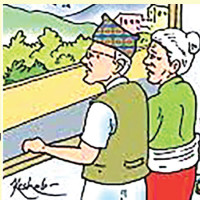- Sunday, 1 March 2026
Treatise on a Multi-dimensional Intellectual
Madan Kumar Bhattarai
The voluminous book portrays various aspects of the life and contributions of Govinda Prasad Lohani, a leftist with a perceptible difference, who inspired a wide range of people of his time through hard work, strong determination, intellectual input and marvellous service to the country. Kapil Lohani and Bimal Bhaukaji deserve accolades for taking the most important initiative to bring out a full memorial volume on Govinda Prasad Lohani, a senior economist, and Marxist theoretician, teacher, planner, banker, writer, land reform official, diplomat and a reputed scholar. Besides, he had an ardent passion for music, cinema and photography with proficiency in playing the flute. He was also a keen sportsman with his interest in hockey, cricket, badminton, football and swimming, and kept his life essentially free of any major ailment.
Born on November 13, 1928, he passed away on December 26, 2020. Though having a full life crossing 92, Lohani had bouts of personal tragedies in his family. While his better half Ruchilabala Devi Lohani predeceased her husband 25 years earlier, he lost his second son Harish Prasad Lohani out of four children (one daughter and three sons) and youngest daughter-in-law Rajani Thapa Lohani some years ago.
The new book is, in fact, a magnum opus in the sense that it encompasses the multi-faceted life of Govinda Prasad Lohani most comprehensively. The voluminous book portrays various aspects of the life and contributions of Govinda Prasad Lohani, a leftist with a perceptible difference, who inspired a wide range of people of his time through hard work, strong determination, intellectual input and marvellous service to the country at large working in different capacities during his long innings in public life.
With a hefty volume comprising a total of 840 pages, the book may conveniently be divided into three parts, the first and major chunk being devoted to assessing different aspects of the life and contributions of Lohani to the country and people at large. There are 124 articles, mostly in Nepali barring a few in English penned by a cross-section of people, including his relatives, close friends, acquaintances and others who came in touch with the senior economist. The second part of the impressive work includes articles written by Lohani, his views and interviews on various issues of national importance and relevant excerpts from his diaries, as he was an incredibly meticulous chronicler of people, events and issues in his diaries for 75 years. The last forty pages of the book constitute a comprehensive photo gallery.
The life of Lohani was a saga of constant struggle symptomatic of a commoner who had to toil hard for his livelihood. He excelled as a teacher and was one of the pillars of the country's central bank, Nepal Rashtra Bank, on its inception having primarily devoted to its research side. He had good contacts with all top intellectuals of his time with one, Narapratap Shumshere Thapa, our youngest Foreign Secretary and diplomat, having helped Lohani in getting employment in the initial days. However, he was critical of our first Foreign Secretary, second Principal of Trichandra College and member of the Public Service Commission, Sardar Narendra Mani Acharya Dixit who was especially prejudiced against him as Dixit was 'strongly anti-Communist.
For many leftists and communists, Lohani was a champion as he had indoctrinated many of them into politics. An activist and headmaster with a passion for politics, Badri Prasad Khatiwada has admitted that Lohani was an inspiration for him to indulge in politics. Important figures among those who founded Progressive Study Circle at the residence of Professor Saraswati Prasad Rimal at Putali Sadak, his associates in this field were Pushpa Lal Shrestha, who was the initiator of the move, Arabinda Nath Rimal, Chandra Dhar Upreti, Madhu Sudan Sharma and Hari Charan Shrestha who retired as a local staff of Nepal Embassy, New Delhi. One factor that distinguished Lohani from other leftists is his clear stand on many issues as he was not dogmatic.
As a studious man endowed with a keen sense of observation and analytical faculty, Lohani started his role as a writer in the early fifties contributing important articles on economic aspects of the county to Jana Bikash, a monthly magazine edited by Rama Devi Pant, spouse of Dr Yadab Prasad Pant who happened to be a maternal cousin of Lohani. Though the magazine stopped publication within a year, there was no looking back for him as he continued to write books, prepare reports and monograms and publish articles even in his nonagenarian age.
Lohani was a man of strong views and, of course, strong likes and dislikes as he hated sheer incompetence in public life. This brought him to conflict with many people he came across and who mattered in Nepal's decision-making. Though admired for his brilliant reporting and assessment of the situation about both the domestic politics and its impact on Nepal's relations with the concerned country, he was not liked within the foreign Ministry as he had been an instrument for recalls of his associates before their terms.
A product of Banaras Hindu University with a Master's degree majoring in Economics, Lohani's class friends at various levels of his study included stalwarts like Dr Tulsi Giri, Pushpa Lal Shrestha, Dr Yadab Prasad Pant, Dr Jaya Narayan Giri, Devendra Raj Upadhyaya, Thakur Dhungana, Dr Kashi Raj Upadhyaya, C.K. Prasai, Saroj Koirala, Dr Mirigendra Raj Pandey, Basu Dev Risal, Surendra Raj Sharma, Tilak Raj Shahi, Tej Bahadur Prasai, Puskar Nath Bhattarai, Gopal Das Shrestha and Ram Hari Joshy.
Some other contemporaries of Lohani were Narayan Prasad Arjel, Radha Prasad Ghimire, Jagat Mohan Adhikari, and Shailendra Kumar Upadhyaya. The canvas for the book is wider as far as the range and quality of contributors of articles on Lohani are concerned. They include politicians, ambassadors, vice-chancellors, members and vice-chairmen of the National Planning Commission, university professors, academicians, economists, administrators, bankers, journalists and intellectuals.
One aspect that made Lohani completely different from others was his sheer honesty in not accepting the offer of King Birendra for a second ambassadorial tenure in Japan or Europe, vice-chairmanship of the National Planning Commission or the Governor of Nepal Rashtra Bank after his return to Kathmandu on completion of his ambassadorial assignment in Pakistan. These positions were quite relevant for him taking into account his varied experience in public life.
I thank and congratulate both the Convenor of the book scheme, Kapil Lohani, and Editor Bimal Bhaukaji for keeping the torch of the wisdom and sagacity of Govinda Prasad Lohani through the publication of many treasures he has collected so far. The new book is an important addition to the study of Nepal's foreign policy among others. I am sure the book provides an important platform for further discussions and research.
(Dr. Bhattarai is a former foreign secretary, ambassador and author of books on Nepal's foreign relations. He can be reached at: kutniti@gmail.com.)
How did you feel after reading this news?

















